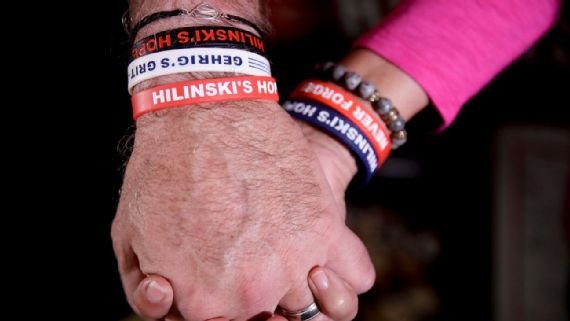The 11 biggest power brokers and advocates shaping the future of college football
ESPN
Mental health: Mark and Kym Hilinski, founders Hilinski's Hope Foundation
Through "Tyler Talks," Mark and Kym Hilinski have spoken at 150 universities across the country over the past three years, raising awareness and erasing stigmas about mental health to student-athletes, coaches and administrators. It's all part of the work they're doing with the Hilinski's Hope Foundation, which they started in 2018 after their son, Tyler, a quarterback for Washington State, died by suicide.
"We do it because we wish somebody had done it before," Mark Hilinski said. "I just wish that Tyler had the opportunity to hear somebody else's story."
"We tell the student-athletes ... if you don't know how to reach out for help, if you don't know how to start a conversation with your coach, with your parents, with your teammates, use Tyler's story," Kym Hilinski said. "What we've heard after we do these talks is that, 'I did what you asked me to do, Mrs. Hilinski. I went home and I told my mom about Tyler and then I told her about how I was struggling, too.'"
The Hilinskis have noticed an increase in conversations surrounding mental health and resources athletic departments are putting toward hiring counselors and mental health professionals since starting the foundation. NCAA legislation requires member schools to make mental health educational materials, services and resources available throughout the year, but there are no statistics that accurately track how many improvements have been made in this area.
In an NCAA survey of more than 9,800 student-athletes released in May 2022, 69% of female athletes and 63% of male athletes agreed or strongly agreed they know where to go on campus if they have mental health concerns. But when asked if they feel comfortable seeking support from a mental health provider on campus, less than half of the respondents said they agreed or strongly agreed with that statement.
Therein lies one of the biggest issues the Hilinskis have identified: While there are more resources, there remains hesitancy to seek help.
"Our athletes are taught to be strong," Kym Hilinski said. "Their sport requires so much of them, and a lot of them see reaching out for help, telling people that they're struggling with their mental health, as a weakness. We try so hard to get across to them that it's actually a strength if they ask for help."
"Tyler Talks" are a part of the Hilinski's Hope Game Plan, which provides a training program for mental health professionals, a facilitator handbook and team training created through a partnership with the NCAA Sports Science Institute and Prevention Strategies.
They have also created an online six-lesson package for student-athletes . Each lesson, about 20-30 minutes, goes in depth on the stigmas associated with mental health, what it's like to see a counselor or therapist,and how to help teammates who are suffering.
For the third straight year, the Foundation has asked schools to participate in College Football and Student Athlete Mental Health Week Oct. 1-8, coinciding this year with Mental Illness Awareness Week. The Hilinskis said they have over 100 schools committed to participating. In Year 1, they had 18.
The Hilinskis know there is plenty work left. This past academic year, multiple student-athletes died by suicide -- news that devastated the Hilinskis.
"Sometimes I ask myself, are we doing enough?" Kym Hilinski said. "What happened, why didn't they reach out for help? Then I talk to their parents and a lot of times the story is the same as ours. They had no idea that their child was struggling. A lot of them are very successful in their sport and they're happy and then one day they're gone."
The Hilinskis believe mental health education should begin earlier than college, and one of their goals is that mental health is taught the same as physical health.
"We think there's a lot of Tylers out there that are afraid to ask for help, for whatever reason -- we've got to clear that path, and sometimes that's saying it over and over again," Mark Hilinski said. "We sound like we're repeating ourselves, but we're talking about life and death."

